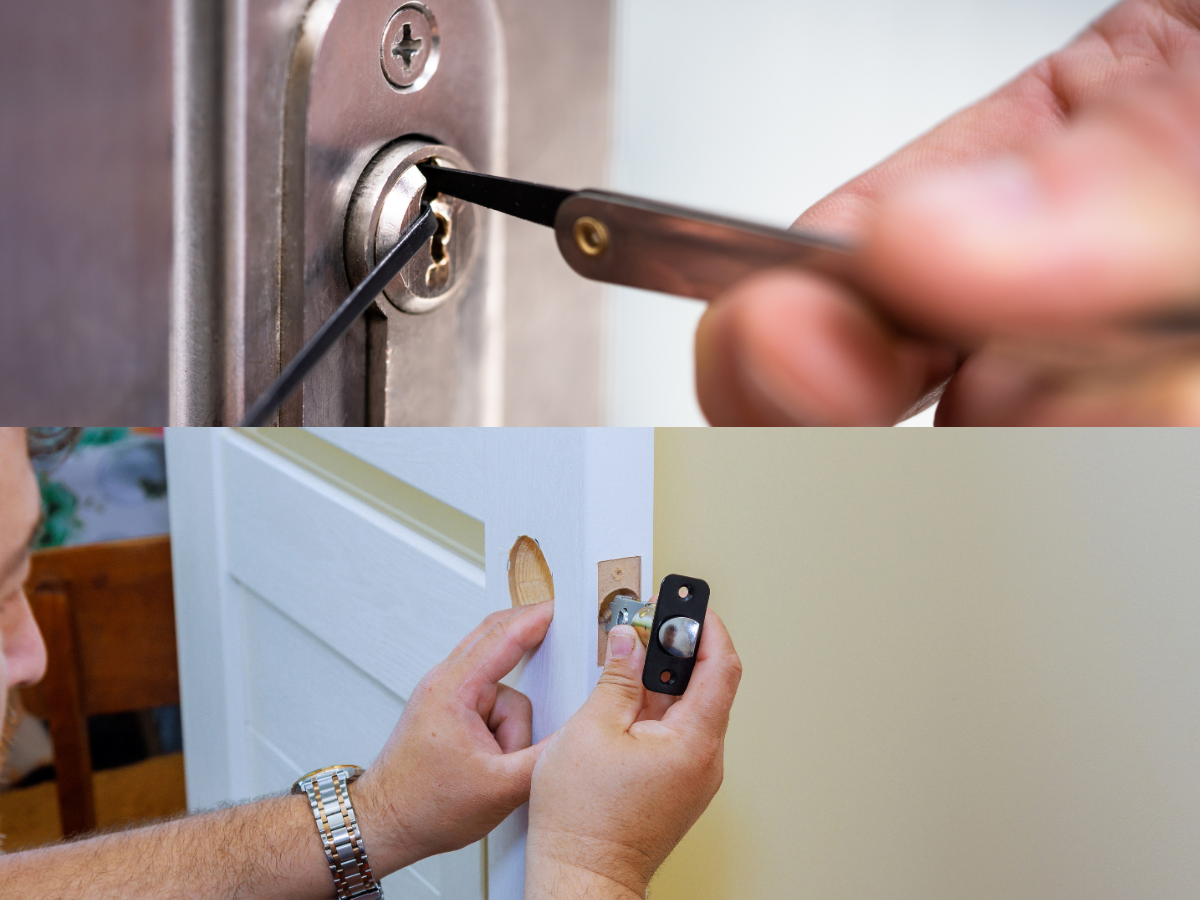When it comes to securing your property, one of the most common decisions homeowners and business owners face is whether to rekey or replace their locks. Both options have unique advantages and are suited to different scenarios. Understanding the difference between rekeying vs. replacement locks can help you make an informed decision that balances cost, convenience, and security.
This blog dives into the key differences, benefits, and ideal situations for each option, ensuring you select the best solution for your needs.
Understanding Rekeying
Rekeying involves altering the internal components of a lock—specifically, its pins or tumblers—so it can only be operated by a new key. The original lock hardware remains in place, and old keys become useless.
How Rekeying Works
- The locksmith removes the lock cylinder.
- The pins inside the cylinder are adjusted or replaced to match a new key.
- A new set of keys is provided, rendering old ones ineffective.
Advantages of Rekeying
- Cost-Effective: Rekeying is typically more affordable than replacing locks since it doesn’t require new hardware.
- Time-Saving: A professional locksmith can rekey multiple locks quickly, especially in emergencies.
- Security Update: Rekeying provides a fresh start when keys are lost, stolen, or shared with others.
- Key Consolidation: Homeowners and businesses can consolidate multiple locks to work with a single key, simplifying key management.
Understanding Lock Replacement
Lock replacement involves removing the existing lock and installing a new one. This process is often chosen when upgrading to a different type of lock or addressing damaged hardware.
How Replacement Works
- The locksmith removes the old lock from the door.
- A new lock is selected and installed, tailored to the door’s specifications.
- Keys are provided for the new lock system.
Advantages of Lock Replacement
- Upgraded Security: Replacing locks is ideal for upgrading to high-security or smart locks, which offer advanced protection.
- Damage Resolution: If locks are damaged or malfunctioning, replacement ensures proper function.
- Enhanced Aesthetics: New locks can complement modern home or office designs, improving curb appeal.
- Future-Proofing: Replacement allows you to adopt cutting-edge technology like smart locks or high-security systems.
Rekeying vs. Replacement Locks: Key Differences
| Feature | Rekeying | Replacement |
|---|---|---|
| Cost | More affordable | Typically higher |
| Time | Faster to complete | Longer due to installation |
| Hardware | Retains existing hardware | Requires new hardware |
| Security Upgrade | Maintains existing security level | Allows for enhanced security |
| Suitability for Damage | Not suitable for damaged locks | Ideal for damaged or outdated locks |
When to Choose Rekeying
Rekeying is the ideal choice in the following situations:
1. Lost or Stolen Keys
If your keys are lost or stolen, rekeying ensures the old keys can no longer grant access.
2. Moving Into a New Home
Rekeying provides peace of mind by eliminating access for previous homeowners or contractors.
3. Changing Tenants or Staff
For landlords and business owners, rekeying after tenant or employee turnover is an affordable way to maintain security.
4. Simplifying Key Management
Rekeying allows you to consolidate multiple locks into a single-key system for added convenience.
When to Choose Replacement
Lock replacement is the best option in these scenarios:
1. Damaged or Worn Locks
If locks are visibly damaged, malfunctioning, or outdated, replacement is the only solution for restoring security.
2. Upgrading to High-Security Locks
Replacing locks is necessary when upgrading to advanced options like deadbolts, smart locks, or biometric systems.
3. After a Break-In
If a lock has been compromised during a break-in, replacement ensures your property is secure against future attempts.
4. Aesthetic or Functional Changes
Replacing locks allows you to choose designs and features that better align with your needs or preferences.
Professional Locksmith Services Make the Difference
Both rekeying and replacing locks require precision and expertise to ensure optimal results. Professional locksmiths offer:
- Assessment: Determining the best option based on your security needs and budget.
- Expertise: Ensuring proper installation or rekeying without damaging doors or frames.
- Customized Solutions: Recommending locks tailored to your property type and requirements.
Tips for Maintaining Your Locks
No matter your choice, regular maintenance ensures your locks remain functional and secure:
- Clean and Lubricate: Prevent dirt and debris from hindering operation.
- Inspect Regularly: Check for signs of wear, rust, or tampering.
- Avoid Force: Never force a key into a lock; consult a locksmith if issues arise.
- Keep Spare Keys Secure: Store spares in a safe, accessible location.
The Best of Both Worlds: Combining Rekeying and Replacement
In some cases, a combination of rekeying and replacement may be the optimal solution. For instance, you might rekey functional locks while replacing outdated or damaged ones. This approach balances cost savings with enhanced security.
Secure Your Property with Tailored Solutions
Whether you choose rekeying vs. replacement locks, the goal remains the same: to protect your property and ensure peace of mind. Understanding the benefits of each option and consulting a professional locksmith ensures you make the best choice for your needs.
Contact Safe and Secure Locksmith today to discuss your options and secure your home or business with expert assistance. Our team is ready to provide reliable and customized solutions that fit your budget and security goals. Let’s get started!

